The Johnston Zoning Board has decided to postpone a decision on five new solar fields in town.
The board was set to weigh the merits of a special use application by Cranston-based Green …
This item is available in full to subscribers.
We have recently launched a new and improved website. To continue reading, you will need to either log into your subscriber account, or purchase a new subscription.
If you are a current print subscriber, you can set up a free website account by clicking here.
Otherwise, click here to view your options for subscribing.
Please log in to continue |
|
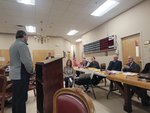
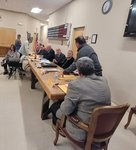
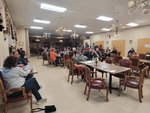
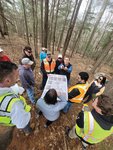
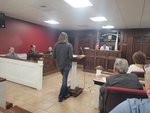
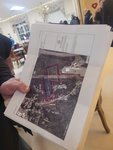


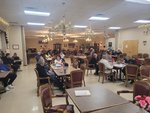
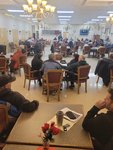
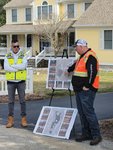
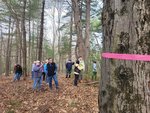
The Johnston Zoning Board has decided to postpone a decision on five new solar fields in town.
The board was set to weigh the merits of a special use application by Cranston-based Green Development at its regular meeting last week.
However, an attorney representing a group of Johnston residents — neighbors and abutters of the land proposed for development — requested a continuance.
The meeting on Thursday, March 31, at the Johnston Senior Center, was packed with residents eager to be heard on the proposal.
According to Green Development, the five solar fields will be constructed on land totaling 324.86 acres. Of those 324.86 acres, approximately 133.15 acres will be surrounded by fencing, with solar panels occupying around 41 percent of the acreage.
A substantial area will be cleared of trees, and some topography altered, across the five parcels in Johnston’s west-end.
Surveyors have been out tying pink ribbons to trees along the likely fence-line. Property-owners along Rollingwood Drive have been spotting specks of pink from their backyards. Many want to know more details about the buffer between the land developers plan to clear and residential property lines.
The audience started Thursday’s meeting with audible hostility. The Zoning Board spoke from a long table at one end of the Senior Center’s main activity room. They spoke quietly, and there were no microphones.
“We can’t hear you,” shouted one resident. Others joined in.
The Zoning Board’s solicitor, attorney Joseph R. Ballirano, interrupted the shouts.
“Is there a motion to just suspend the rules and take up the solar farms?” He asked the board.
A motion was made, seconded and approved unanimously.
“Do you have a microphone?” One woman asked loudly. “We’re having trouble hearing.”
“You should have microphones!” One man shouted.
“This is a public meeting, we need to be able to hear what’s transpiring,” Another man said, his voice booming.
“Well move up, you’re way in the back,” a board member shouted back. “Don’t be yelling at us. We just started.”
Attorney Matthew J. Landry, of the Providence law firm Blish & Cavanagh LLP, stood in the front of the room, to the right of the audience. He was recently retained to represent a group of neighbors who oppose the solar fields.
Attorney Al Russo, representing Green Development, stood to the right of the crowd.
The two lawyers tried to introduce themselves but had a hard time talking over the crowd. Some residents, many of whom had not hired an attorney, worried aloud that they were about to lose their chance to speak. Confusion ensued, but eventually the three lawyers broke through.
“I represent a small group of abutters that abut various projects that are being proposed by Green Development,” Landry said as the crowd slowly calmed. “We are respectfully asking for a continuance. I did speak to Mr. Russo today. I understand he has no objection to my request. I apologize for the timeliness of the request. I would certainly give the board much more notice … I’ve just recently been retained, and getting up to speed. So we’d like an opportunity to review this submission and present an appropriate respond.”
Ballirano called one of Landry’s clients up and asked him if he received notice.
“Let me speak for my client,” Landry interrupted. “We have discussed the notice issue with the town. I’ve discussed it with Mr. Russo. We believe there was defective notice as to my client, because he was not named in the abutters list that was submitted. He recently purchased this property.”
“We’re going to continue this in a public meeting,” Ballirano said. “So this notice carries.”
Town Councilman Robert Civetti stood up from the crowd and asked to speak.
He was sworn-in and stood at the lectern in the center of the room, facing the Zoning Board.
“During this whole process, I spoke to many residents as we walked the properties,” Civetti said. “And I appreciate Mr. Russo and his clients walking the properties with us, but there’s a lot of residents out there that say they never received the notice.”
Civetti’s district covers the area in question, and he represents the constituents who will be affected most by the proposed solar developments. He and a few dozen neighbors spent a recent Saturday touring the potential development sites.
“I would like to request the notices are sent,” Civetti told the board. “I would like those notices to be sent certified mail, so that we do have the cards certifying that they were sent to the residents.”
Russo answered.
“The problem with that is that there are over 500 abutters to these five projects,” Russo told Civetti. “Certified mail is $7 …”
The crowd erupted in jeers and laughter.
“With all due respect, if they can’t afford to pay that price, then they shouldn’t be trying to put solar panels in the town,” Civetti responded. “Everyone here at the risk of losing property value. Plain and simple. There are studies out there that show property values decrease with this going in a residential area. So you know where I stand. I’m not hiding anything. If they can’t meet that requirement, I think we have a bigger problem here.”
“I’m not saying we can’t meet that requirement,” Russo replied. “I’m just saying that we don’t want to spend money that we don’t need to spend. Everyone involved in this project knows about it. They’re all here tonight.”
The crowd stirred again.
“You just said there’s 500 people,” Civetti argued. “There’s not 500 people here. There’s a lot of residents … that did not know about this.”
The five projects include — a 1.0 Megawatt solar field, called, GD Johnston Elmgrove II, at 25 Elmgrove Ave. (AP 51 Lot 4, zoned R40); GD Johnston Harilla I, a 2.25 MW solar field at 28 Harilla Lane (AP 51 Lots 9 & 11, zoned R40); GD Johnston Winsor I, a 4.0 MW solar field at 46 Winsor Ave. (AP 60 Lot 4, zoned R40); GD Johnston Winsor II, a proposed 8.0 MW solar field at 86 Winsor Ave. (AP 60 Lots 2, 20, 86, zoned R20 & R40); and GD Johnston Winsor III, a proposed 24.0 MW solar field at 112 Winsor Ave. (AP 59 Lot 15, zoned R40).
Solar development is a special use for residential zones and permitted under Johnston’s zoning laws.
Johnston resident Rosemarie Ranzie stood and asked to speak. She was sworn in and took her place at the lectern.
“I moved into my house on Meadowbrook (Drive), which unfortunately I found out yesterday, thanks to my neighbors there was a meeting and this was being done,” Ranzie told the board. “This whole thing abuts my property. I just bought it in June, and I was not told, one, when I brought the property, and, two, I have not received one letter or notice. So this is all news to me.”
Ranzie spotted a man, possibly surveying, in her backyard several months ago.
“What he was surveying for, I did not know,” Ranzie said. “This is one, an insult, because I haven’t been notified. And two, it affects me. It is my backyard. And I don’t want to see rubbish in my backyard. I bought this property specifically because it was a nice residential area, and the houses are spaced out. The last thing I want to hear or see is solar panels in my yard.”
Although Johnston planning officials documented the importance of preserving land like the parcels now identified for development, during the last update of the Johnston Comprehensive Plan in 2007, the town’s elected officials never moved to purchase or take possession of any of that land. Instead, the parcels remained in private hands and those owners have decided to sell.
Green Development and Johnston Mayor Joseph M. Polisena have both argued that the land in question will likely be developed no matter what happens to the solar field proposal.
Polisena insists solar fields will make better neighbors than new houses, and tax town resources far less. Green Development has pledged to turn the land over to the Johnston Land Trust and lease the properties off the town for an agreed period of time (likely 20-25 years). Once the company decommissions the arrays, the land will remain under the Land Trust’s ownership, and future elected officials will determine the sites’ ultimate future.
Resident Paul Francis voiced concerns for the environment and property values. He referenced other projects by solar development companies in the state, and brought the issue home to Hartford Avenue, the ongoing construction site of a future Amazon mega-facility.
“If anybody thinks that it’s a good idea, take a ride over here to Route 6 and go up to where they’re doing the project for … Amazon, it’s disgusting what they’re doing,” Francis told the board.
Francis then turned to address the developers.
“You guys wipe everything out,” he said. “There’s nothing left. You’re going to depreciate our properties better than $5,000 a piece, within a mile radius of that facility you want to install. I can guarantee you it’s not in your backyard. But you’re going to put it in ours.”
If the Zoning Board gives its blessing, the plans move back to the Planning Board for a final set of conditions and approvals.
The board voted unanimously to delay the proceedings to its next monthly meeting and then took a five-minute recess before finishing off the rest of the evening’s agenda.
Comments
No comments on this item Please log in to comment by clicking here